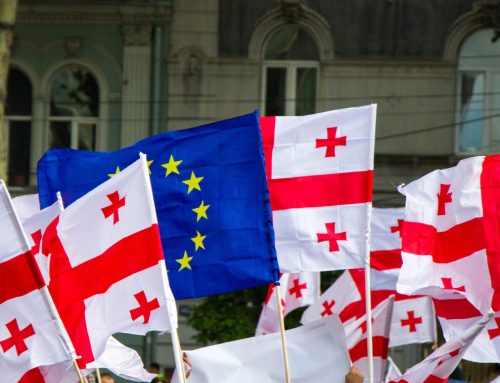Russia
Last week, Russian diplomats and state media put forward a massive amount of commentary on the migrant crisis taking place on the Belarusian-Polish border. Six of the top ten most frequently used phrases by Russian accounts tracked on Hamilton 2.0 related to the issue. Kremlin-backed accounts argued that neither Minsk nor Moscow is responsible for the crisis. President Vladimir Putin and Russian diplomats blamed the European Union’s policies toward the Middle East and the bloc’s high living standards for displacing and attracting the migrants. Russian Ministry of Foreign Affairs spokeswoman Maria Zakharova suggested that the migrant crisis was a “planned campaign” by the West against Belarus. State media focused heavily on the inhumane conditions migrants face, highlighting the freezing temperatures, the need for water, and fights over food, while emphasizing Belarusian efforts to deliver humanitarian aid and criticizing Polish forces for beating and using other “psycho terrorizing techniques” against migrants. Meanwhile, some diplomatic accounts attempted to play down the crisis, suggesting the number of migrants was “more or less normal.” Russian officials also accused Western outlets of “#fakenews spreading and manipulation of information” about the crisis.
Russian diplomats and state media also pushed back against U.S. warnings that the Kremlin could be preparing for a new military operation in Ukraine. Putin dismissed the U.S. statements as “alarmism,” and Kremlin spokesperson Dmitry Peskov said the comments were groundless. Russia’s Deputy Foreign Minister Sergei Ryabkov criticized U.S. Secretary of State Antony Blinken’s warning that Russia should not repeat the “2014 mistake,” referring to Russia’s illegal annexation of Crimea. Ryabkov argued, “The mistakes of that year were made by the people who allowed a state coup in Ukraine, including the then U.S. administration.” Russian diplomatic accounts also accused the West of escalating tensions with the Kremlin. The Russian Embassy in the United Kingdom promoted the idea that Western efforts to supply Ukraine with arms “only encourages a solution by force.” Alongside these messages about a potential conflict, Moscow-linked accounts accused Ukraine and the United States of glorifying Nazism—a common trope in the Kremlin’s anti-Ukrainian messaging.
Russian state-backed coverage of COP26 dropped considerably from previous weeks as the UN climate conference came to an end. Moscow-funded media provided live updates on the drafting and publication of the meeting’s final agreement. State outlets went on to amplify comments from UN officials and activists who were disappointed that the meeting did not set more ambitious goals. One state-backed account argued that none of the governments have “any intention to follow through on their climate pledges.” As with previous weeks, Kremlin-funded media highlighted climate protesters around the world.
China
Last week, Chinese state media covered the ongoing crisis at the Polish border with a distinctly anti-NATO/EU slant. Xinhua and the People’s Daily shared a statement from Russian President Vladimir Putin blaming Western countries for the crisis. Much of the content from Chinese state media emphasized Russia’s constructive role, as well as the possibility that Russia might step in to ensure Belarus’ “safety” if needed. CGTN also showed how Belarusian authorities helpfully set up tents at the border to “feed children.” On the diplomatic side, the Chinese embassy in Belarus has kept a low profile, promoting vaccine donations in Mandarin and promoting Xi’s latest speech in Belarusian. The Chinese Consul in Osaka, however, retweeted a video from Russian state media outlet Redfish blaming NATO for the crisis. The Global Times also trolled the United States over a U.S. citizen who travelled to Belarus to escape “repression in his native US.” That article downplayed the fact that the man in question is a fugitive who fled the United States due to his role in the January 6 insurrection.
Taiwan remained a particular topic of interest last week. Two songs—“Go to Taiwan in 2035” and “Take the high-speed to Taipei,” both of which feature a high-speed train linking China with Taiwan across the Taiwan Strait—recently went viral on TikTok. Both songs were promptly re-appropriated by Chinese diplomats and state media, with the editor-in-chief of the Global Times commenting that they showed “a psychological expectation that the reunification should be realized by 2035.” Additionally, several Republican members of Congress’ surprise visit to Taiwan did not go unnoticed. Russian state media brought up the issue during the Chinese Foreign Ministry’s Tuesday press conference, giving the spokesperson a chance to accuse the U.S. lawmakers of “playing with fire.” On the same day, the Global Times denounced “a sneaky visit” that “hinders Biden’s China policy.”
While Afghanistan has somewhat faded from the headlines, it remained the sixth most mentioned country in tweets from Chinese Twitter accounts monitored on Hamilton 2.0. While China did not attend the “Delhi regional security dialogue” on Afghanistan last Tuesday, it did attend the “troika plus meeting” on Afghanistan hosted by Pakistan the following day. Ethiopia also received substantial coverage last week, with four of the top five most retweeted tweets covering the ongoing conflict in the country. Some praised the “people of Ethiopia,” while others denounced U.S. interventionism.
Iran
The Iranian press and diplomatic corps criticized U.S. National Security Advisor Jake Sullivan on Twitter last week, accusing him of claiming that Iran had left the JCPOA. Ministry of Foreign Affairs spokesman Saeed Khatibzadeh generated moderate engagement by addressing his tweet directly to Sullivan and tagging him in it. Iranian media used the exchange as an opportunity to lay out the conditions for a U.S. return to the JCPOA. Similarly, Iran’s mission to the UN tweeted that “the U.S. is not in a position to preach about others about the implementation of their commitments” and accused Biden of continuing “Trump’s maximum pressure policy.” Deputy Foreign Minister Ali Bagheri went on a press offensive to argue for Iran’s perspective on the negotiations, sitting for interviews with ARD and Der Spiegel in Germany, as well as for a widely televised and promoted interview on Press TV. Foreign Minister Hossein Amir-Abdollahian tweeted strong support to Bagheri and categorized the negotiations in Vienna as “successful.” Other Iranian outlets focused on additional elements of the Vienna negotiations, including support for Iran’s position from Russian Foreign Minister Sergei Lavrov.
Following a week of heavy media coverage, the Islamic Revolutionary Guard Corps (IRGC) changed its story on the saga of the Vietnamese tanker MV Southys, now claiming that the tanker carried stolen oil that has since been unloaded in Iran. After the cargo was unloaded, a judge ordered the tanker released, and the tanker and its crew have since left Iranian waters.
The views expressed in GMF publications and commentary are the views of the author alone.








